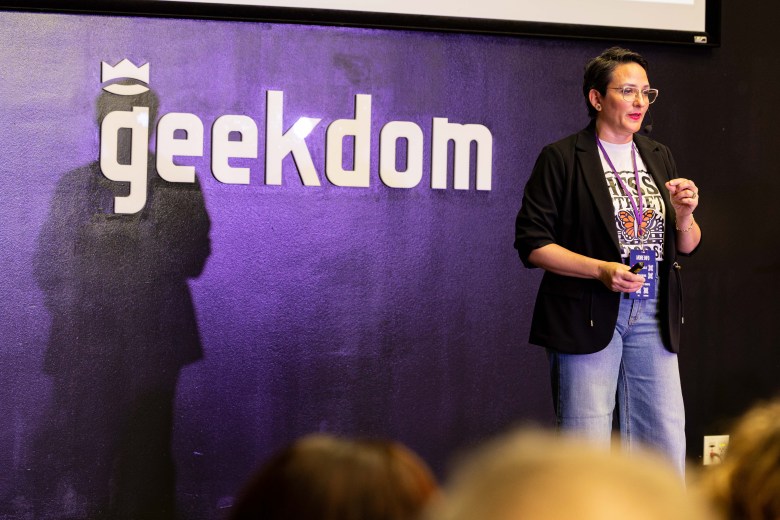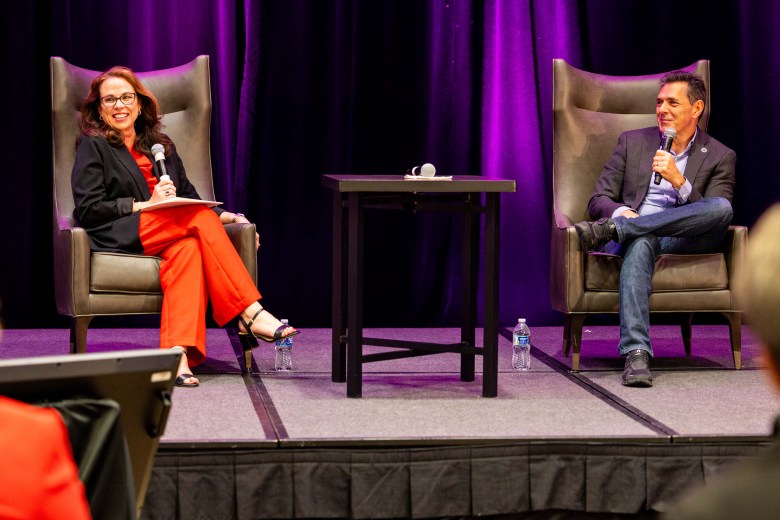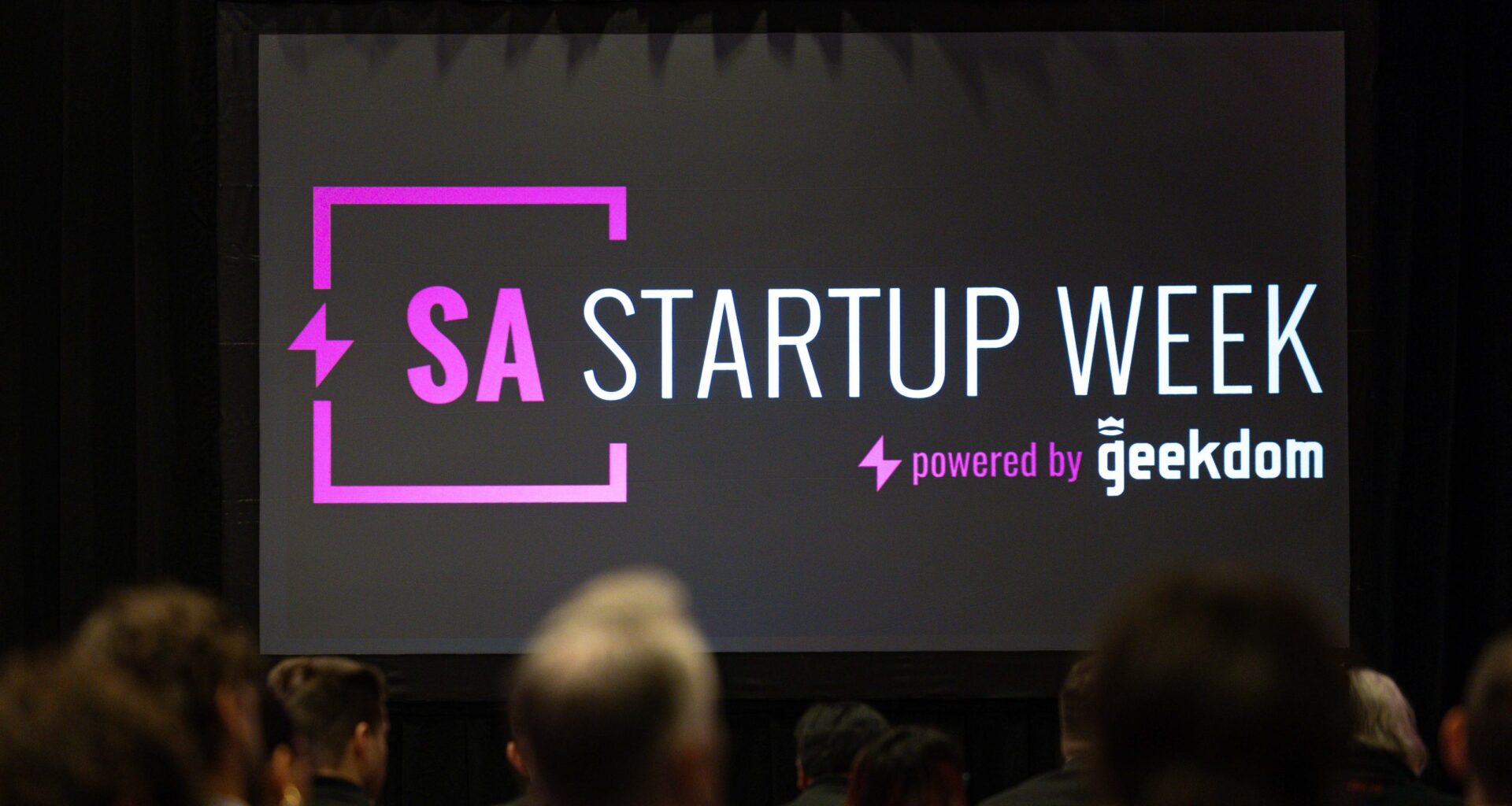Local business and tech leaders have spent more than a decade trying to jumpstart new, bigger companies in San Antonio. At the 10th San Antonio Startup Week, a few of those leaders reflected on what’s been achieved and what still needs to be done.
The downtown event, organized by local business incubator Geekdom, includes workshops, panels, investment opportunities and expos that give local entrepreneurs a chance to share their work and learn about business.
On Wednesday, Geekdom CEO Charles Woodin spoke about a decade-plus of business and civic leaders building a robust tech and startup ecosystem — a community of collaborating entrepreneurs that attracts capital and creates business and jobs on a larger scale.
His message? Progress has been made, but after 10 years, San Antonio is halfway there.
“I would look at it as the adolescent stage,” Woodin said. “We’ve got all the resources we need to survive.”
Now, he said, it’s a matter of bringing that together and getting those resources and investments to pay off.
Woodin isn’t the only one. On a recent episode of the bigcitysmalltown podcast, Juan “Sebastian” Garzon, a managing partner for a local investment firm, outlined a similar timeline for creating a community of profitable and proliferate startups and companies that are present in places like Silicon Valley, Boston and even nearby Austin.
“It takes 15-20 years for those ecosystems to fully develop and flourish and get to see the results that they have now,” Garzon said. “What that tells me is we’re still on that journey.”
The “there” San Antonio is getting to has also shifted. Leaders like Woodin are playing to San Antonio’s strengths.
Geekdom has broadened its focus from tech startups to other new businesses, like store-bought packaged goods, to include more San Antonio entrepreneurs and industries.
Business incubators, nonprofits that create workspace and learning resources for business owners, have sprung up for San Antonio-specific sectors, like VelocityTX in the bioscience and medical field. Even groups like TechBloc, which advocates for technology enterprises, are focused on established local industries, like cybersecurity and manufacturing.
Those efforts are channeled toward a common goal, create businesses and jobs by supporting entrepreneurs. Geekdom was founded by local businessmen Graham Weston and Nick Longo in 2013. It’s grown, Weston said, but that goal remains.
“The scale’s bigger, but the mission’s the same — connecting people with the resources and inspiration to build their dreams,” Weston said by email this week when reflecting on Geekdom’s mission.
Building an ecosystem
Luis Martínez had been around Geekdom since 2013. A former director for Trinity University’s Center for Innovation and Entrepreneurship, he’s been a mentor at Geekdom and now works at Capital Factory, a venture capital firm.
He’s seen Geekdom grow and, at times, stumble. Between 2013 and 2019, he said, the organization founded startup week, other incubators started and investors began to take notice.
In its first decade, Geekdom startups created more than 2,000 jobs and raised $422 million from investors, according to a 2022 report.
Martínez said the COVID-19 pandemic was a stumbling block. Geekdom lost members as the economy slowed down.
“[One] phase ended when COVID happened,” Martine said. “From 2022 onward, the last three years, it’s really been about building.”
In 2024, Geekdom said it was bouncing back and it helped launch 160 new businesses that year. It entered into a $1.7 million contract to manage Launch SA, the city’s business resource center, in 2023.
“Success shows up in the numbers: companies launched, capital raised, jobs created & lasting impact,” Weston said, citing local companies like Parlevel, Floatme, Big Sun Solar and Porchpass that have found sustainability in the housing, short-term loan and solar industries.
 Business owner Maria Flores speaks to judges about her company Hess Street Foods during the Women Founders Network pitch competition event at the Geekdom Event Center on Oct. 15, 2025. Credit: Amber Esparza / San Antonio Report
Business owner Maria Flores speaks to judges about her company Hess Street Foods during the Women Founders Network pitch competition event at the Geekdom Event Center on Oct. 15, 2025. Credit: Amber Esparza / San Antonio Report
Where to next?
“In comparison to places like Austin, Dallas-Fort Worth and Houston, we still have a long way to go,” Martínez said.
Woodin also sees room for growth. Success can mean a lot of things for new businesses, he said. Some want to stay small and local, he added, and that’s fine. Small businesses create jobs and wealth and Geekdom values both.
“There is little difference [to us] between a mom-and-pop, brick-and-mortar location,” he said. “And a company that breaks through the national noise.”
But Woodin also hopes to see more investment, acquisitions and larger public companies grow out of Geekdom. He hopes to see San Antonio companies get initial public offerings and sell stock, like Rackspace did for the first time in 2008.
“That is still a metric I’d love to see. How many public companies can we launch?” he said.
Getting there isn’t easy. There’s a reason it takes time, Woodin said. A large part of Geekdom’s work is connecting new business owners with investors, and there is always a need for more capital, he said.
“We do need people that are a little more open to risk,” he said.
It’s a challenge many cities in middle America face, he said. Investors tend to focus on coastal metropolises and not what’s in between. Geekdom helps business owners get off the ground, but it’s also trying to get San Antonio on the radar of the funds and firms that rove the world, looking for the ground-floor opportunities and the next big thing.
What do investors want?
San Antonio Startup Week is an opportunity for some of those investors to sit in the same room as small businesses.
Doug Parker works for a small company that makes investments for $100,000 to early stage businesses. He attended a Women’s Founders Network pitch competition to look for opportunities. Parker isn’t thinking about the companies, though, he’s thinking about the people running them.
“That’s what we’re looking for,” he said. “People who are creative in solving a problem.”
Investors say they’re looking at startups and investment opportunities under a microscope.
Cat Dizon is Geekdom’s board chair and a co-founder of Active Capital. Active Capital makes investments between $100,000 and $1 million and encounters larger businesses than Parker does. The people still matter, Dizon said.
“A huge portion of how successful the company is going to be is how well they work together,” she said.
Where a new business is also doesn’t guarantee success, said Daniel Lubetzky, the billionaire founder of KIND Snacks who now runs Camino Partners, an investment company. Lubetzky, who went to high school and college in San Antonio, spoke at startup week.
“I think about a specific sector and product and if the entrepreneur’s amazing and if they’re in San Antonio in Timbuktu or somewhere in the United States, then I’m more likely to [invest],” Lubetzky said.
San Antonio does have strengths that were worth emphasizing, though, Lubetzky added, like lower labor costs, more affordable living and a deep cultural history.
“I just would really lean into understanding what are the competitive advantages of San Antonio and, for the product or service, is it seeking to cultivate the right fit for that city?” he said.
 KIND Snacks Founder and Shark Tank Shark Daniel Lubetzky, right, speaks with Japhet Media founder and moderator Mary Ullmann Japhet during a fireside keynote chat during San Antonio Startup Week on Wednesday. Credit: Amber Esparza / San Antonio Report
KIND Snacks Founder and Shark Tank Shark Daniel Lubetzky, right, speaks with Japhet Media founder and moderator Mary Ullmann Japhet during a fireside keynote chat during San Antonio Startup Week on Wednesday. Credit: Amber Esparza / San Antonio Report
The next 10 years
Part of San Antonio Startup Week is providing educational workshops and resources to people starting businesses. Geekdom and other local incubators provide new businesses with key resources and knowledge, Martínez said.
“That level of entrepreneurial education, financial literacy and business literacy is incredibly important,” he said.
Local universities and nonprofits can provide that, he said, and increase the workforce and expertise in a community. That’s part of building a startup ecosystem, Woodin said, where there are enough people with enough ideas that new, profitable ventures become more common.
“We haven’t had another Rackspace-scaled outcome,” he said. “And that’s okay. it takes time.”
Local business leaders are trying to cast a wider net and spread resources and support. Geekdom, for example, has expanded its programming beyond tech firms.
It accomplishes some of what Lubetzky laid out — playing to local strengths.
“Over the last four years, we’ve really opened up,” said Dizon, Geekdom’s board chair. “We’re able to grow our community by welcoming other areas.”
Geekdom has increased support for consumer packaged goods companies and nonprofits, Dizon said.
The next Google might not come out of San Antonio, but there are other sectors where the city is growing, like medical technology and aerospace. Growth can feel slow, Martínez said, but building a reality where San Antonio is known for new businesses and startups is not a quick process.
“This work takes a long time,” he said. “The biggest surprise is here we are, 10 years later. It feels like we should be further along than we are, but these things take time.”

